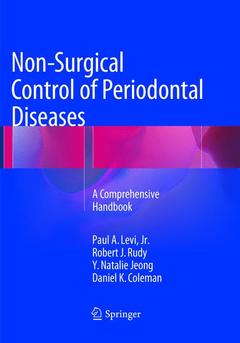Description
Non-Surgical Control of Periodontal Diseases, Softcover reprint of the original 1st ed. 2016
A Comprehensive Handbook
Authors: Levi Jr. Paul A., Rudy Robert J., Jeong Y. Natalie, Coleman Daniel K.
Language: English
Subject for Non-Surgical Control of Periodontal Diseases:
105.49 €
In Print (Delivery period: 15 days).
Add to cartPublication date: 03-2019
216 p. · 17.8x25.4 cm · Paperback
147.69 €
In Print (Delivery period: 15 days).
Add to cartPublication date: 12-2015
216 p. · 17.8x25.4 cm · Hardback
Description
/li>Contents
/li>Biography
/li>Comment
/li>
This handbook has been designed for practicing dental clinicians and students, which includes dental hygienists, general dentists, periodontists, and students of dental hygiene and dentistry who are responsible for treating patients with a broad spectrum of periodontal diseases. The book will enable practicing clinicians and students to successfully meet the challenge of excellent patient care, by providing , in a concise and simplified format, both classic and contemporary practical measures that address all aspects of non-surgical periodontal disease management. Readers are carefully guided through an extensive body of accumulated knowledge in eight broad chapters which includes: the patient?s involvement in disease control and prevention, the clinician?s instrumentation for the diagnosis and basic treatment of gingivitis/periodontitis along with pharmacotherapeutics and supportive maintenance therapy to ensure long-term success. Numerous illustrations help to bring the presented ideas and suggestions to life and the succinct nature of the text will allow readers to transfer useful information quickly to their own clinical settings.
Empowering Your Patients: From Compliance to Concordance: Basics.- Methods of Plaque Removal by the Patient. Instrumentation for Diagnosis and Basic Treatment of Gingivitis/Periodontitis: Periodontal Probing and Detection of Calculus.- Theory of Scaling, Root Planing, Soft Tissue Curettage.- Local Anesthesia for Scaling, Root Planing and Gingival Curettage.- Hand Instrumentation.- Power Instruments. Pharmacotherapeutics: Theory.- Local Delivery.- Systemic.- Oral rinses. Supportive therapy/Necessary for Long Term Success: Step by step protocol for maintenance hygiene therapy.- Relationship between general dental office and periodontal specialist office.- Relationship between patient and therapist.
Dr. Paul A. Levi, Jr. is an Associate Clinical Professor in the Department of Periodontology at Tufts University School of Dental Medicine, Visiting Professor at Universitat Internacional de Catalunya in Barcelona, Spain and a Clinical Instructor at the Harvard University School of Dental Medicine. He earned a BS at St. Lawrence University in Canton, NY and his D. M. D. and Certificate in Periodontology from Tufts University. He is a Diplomate and a Director of the American Board of Periodontology. Additionally, he maintains a private practice limited to Periodontics and Implant surgery in Burlington, VT.
Dr. Robert J. Rudy earned his D.M.D. from Tufts University in 1970. After serving as a captain in the USAF, from 1970 to 1972, he earned a Certificate in Periodontology from the University of Washington, in Seattle, in 1975. Returning to Boston and the Tufts School of Dental Medicine, Dr. Rudy became a Clinical Instructor in the Department of Periodontology. Ten years later he became an Associate Clinical Professor. From 1995-2014, Dr. Rudy served as Director of Pre-doctoral Periodontology. Additionally, he maintained a private practice, in Brookline and Newton Centre, Massachusetts, from 1975-2015.
Dr. Y. Natalie Jeong is an Assistant Professor in the Department of Periodontology at Tufts University School of Dental Medicine. She earned her D. M. D. and her Certificate in Periodontology from Tufts University. She is a Diplomate and a board examiner of the American Board of Periodontology. She is a director of Lincoln Dental Study Club and maintains a private practice limited to Periodontics and Implant surgery in Lincoln, Massachusetts.
Dr. Daniel K. Coleman is a Diplomate of the American Board of Periodontology. He is a Clinical Instructor in the Department of Periodontology at Harvard University School of Dental Medicine. Dr. Coleman earned his B.S. at Trinity College
Emphasis on patient involvement in disease control and prevention of future disease
Emphasis on supportive maintenance therapy
Concise up-to-date recommendations for non-surgical therapy
These books may interest you

Comprehensive Preventive Dentistry 113.95 €



